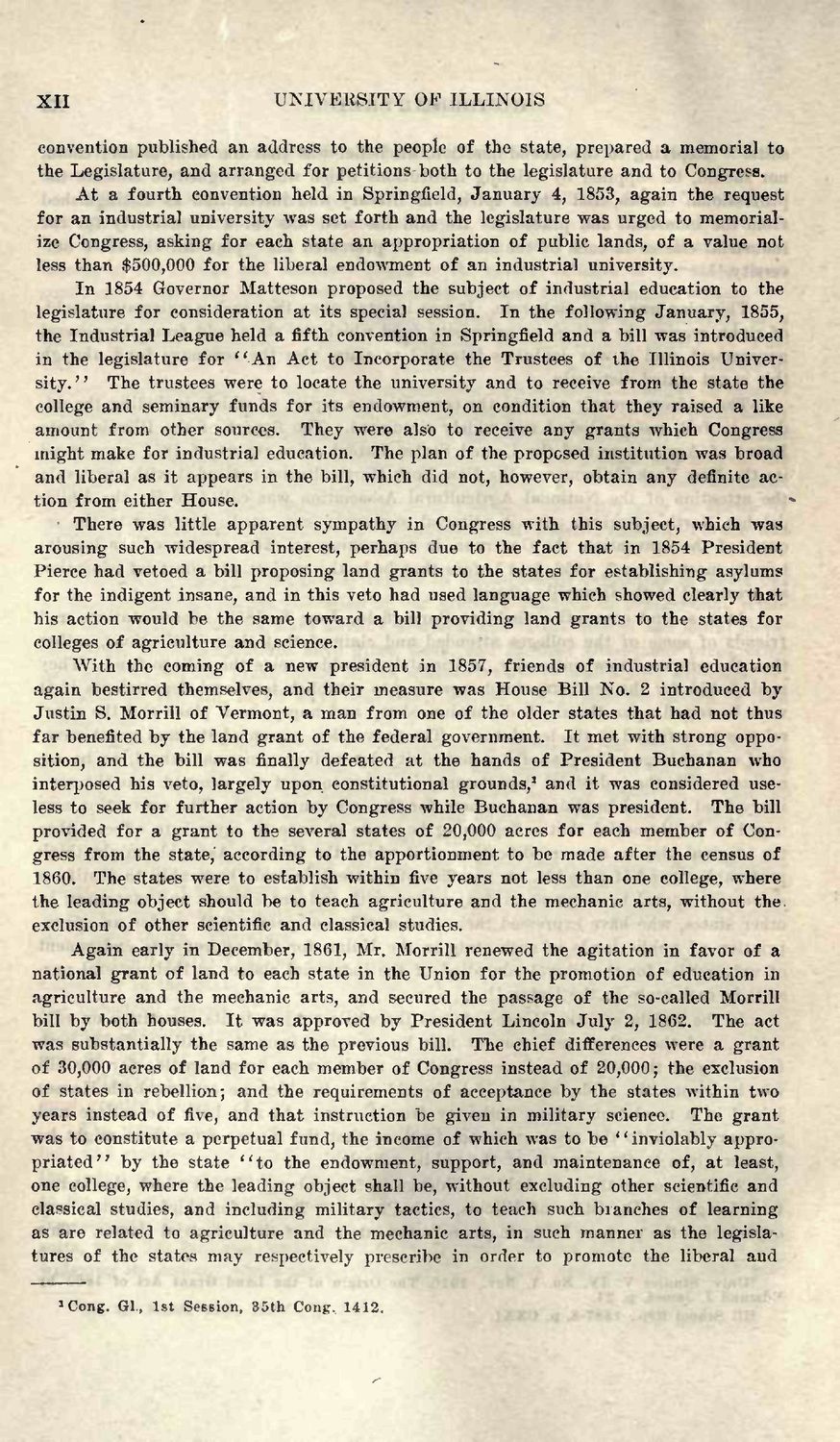| |
| |
Caption: Book - Early History of University (1916)
This is a reduced-resolution page image for fast online browsing.

EXTRACTED TEXT FROM PAGE:
XII U N I V E R S I T Y OJ'1 I L L I N O I S convention published an address to the people of the state, prepared a memorial to the Legislature, and arranged for petitions both to the legislature and to Congress. At a fourth convention held in Springfield, January 4, 1853, again the request for an industrial university was set forth and the legislature was urged to memorialize Congress, asking for each state an appropriation of public lands, of a value not less than $500,000 for the liberal endowment of an industrial university. In 1854 Governor Matteson proposed the subject of industrial education to the legislature for consideration at its special session. I n the following January, 1855, the Industrial League held a fifth convention in Springfield and a bill was introduced in the legislature for " A n Act to Incorporate the Trustees of the Illinois Univers i t y . " The trustees were to locate the university and to receive from the state the college and seminary funds for its endowment, on condition that they raised a like amount from other sources. They were also to receive any grants which Congress might make for industrial education. The plan of the proposed institution was broad and liberal as it appears in the bill, which did not, however, obtain any definite action from either House. • There was little apparent sympathy in Congress with this subject, which was arousing such widespread interest, perhaps due to the fact that in 1854 President Pierce had vetoed a bill proposing land grants to the states for establishing asylums for the indigent insane, and in this veto had used language which showed clearly that his action would be the same toward a bill providing land grants to the states for colleges of agriculture and science. • With the coming of a new president in 1857, friends of industrial education again bestirred themselves, and their measure was House Bill No. 2 introduced by Justin S. Morrill of Vermont, a man from one of the older states that had not thus far benefited by the land grant of the federal government. I t met with strong opposition, and the bill was finally defeated at the hands of President Buchanan who interposed his veto, largely upon constitutional grounds," and it was considered useless to seek for further action by Congress while Buchanan was president. The bill provided for a grant to the several states of 20,000 acres for each member of Congress from the state,' according to the apportionment to bo made after the census of 1860. The states were to establish within five years not less than one college, where the leading object should be to teach agriculture and the mechanic arts, without the. exclusion of other scientific and classical studies. Again early in December, 1861, Mr. Morrill renewed the agitation in favor of a national grant of land to each state in the Union for the promotion of education in agriculture and the mechanic arts, and secured the passage of the so-called Morrill bill by both houses. I t was approved by President Lincoln Jul}- 2, 1862. The act was substantially the same as the previous bill. The chief differences were a grant of 30,000 acres of land for each member of Congress instead of 20,000; the exclusion of states in rebellion; and the requirements of acceptance by the states within two years instead of five, and that instruction be given in military science. The grant was to constitute a perpetual fund, the income of which was to be "inviolably approp r i a t e d " by the state " t o the endowment, support, and maintenance of, at least, one college, where the leading object shall be, without excluding other scientific and classical studies, and including military tactics, to teach such blanches of learning as are related to agriculture and the mechanic arts, in such manner as the legislatures of the states may respectively prescribe in order to promote the liberal and 'Cong. Gl., 1st Session, 35th Cong, 1412.
| |